2013版初中英语全程复习方略课件(教材复习案)七年级下册 Modules 5-8(外研版)(共62张PPT)
文档属性
| 名称 | 2013版初中英语全程复习方略课件(教材复习案)七年级下册 Modules 5-8(外研版)(共62张PPT) | 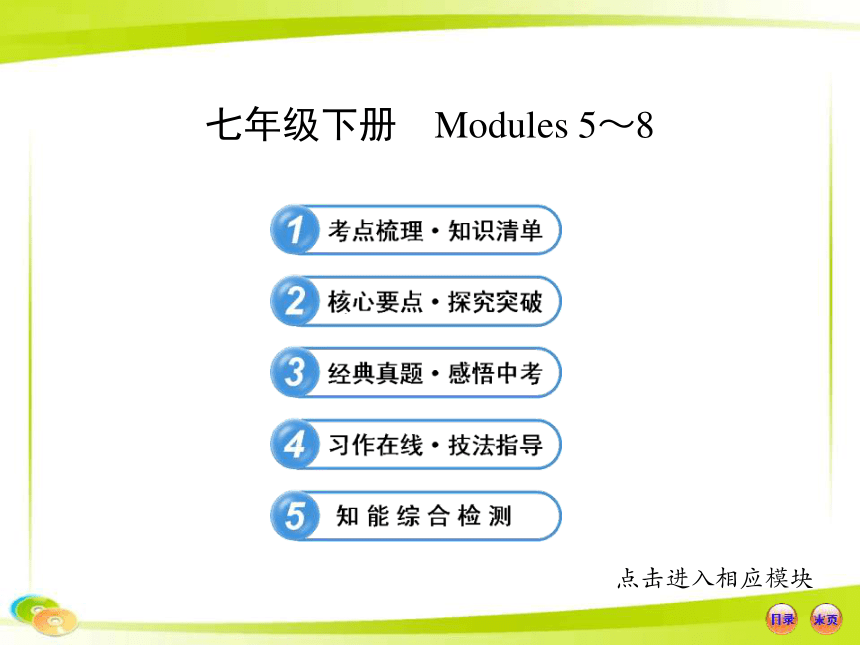 | |
| 格式 | zip | ||
| 文件大小 | 1.1MB | ||
| 资源类型 | 教案 | ||
| 版本资源 | 外研版 | ||
| 科目 | 英语 | ||
| 更新时间 | 2014-03-01 17:47:46 | ||
图片预览

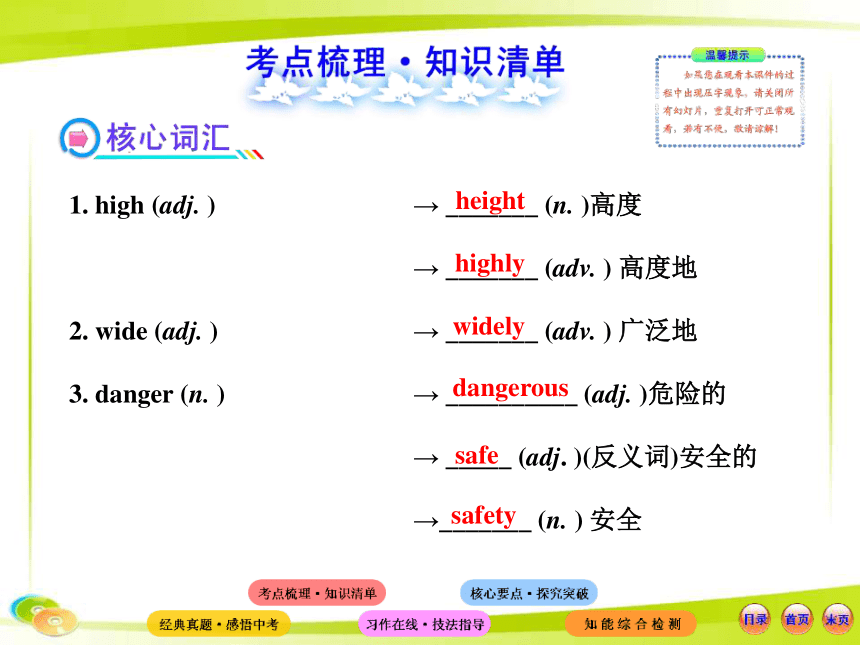
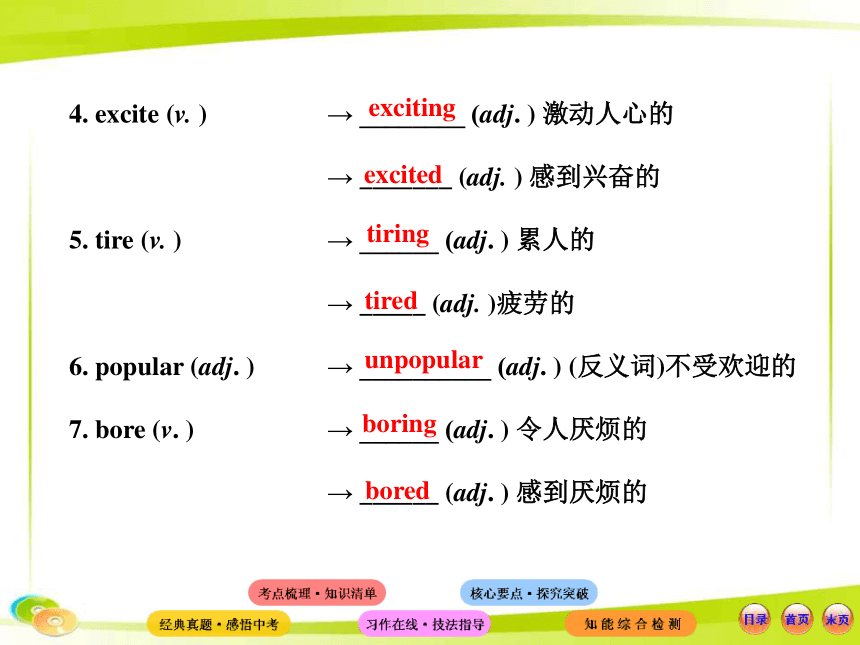
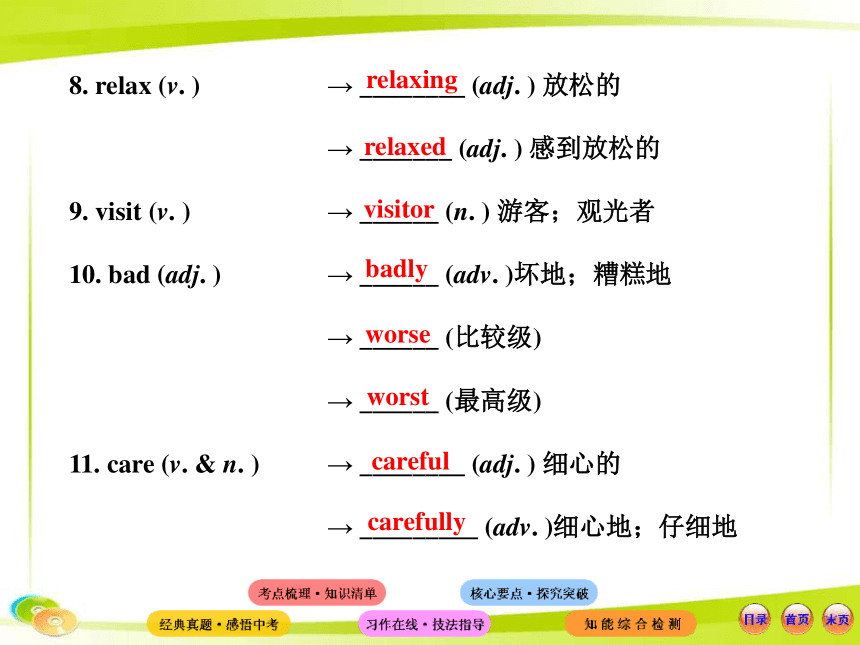
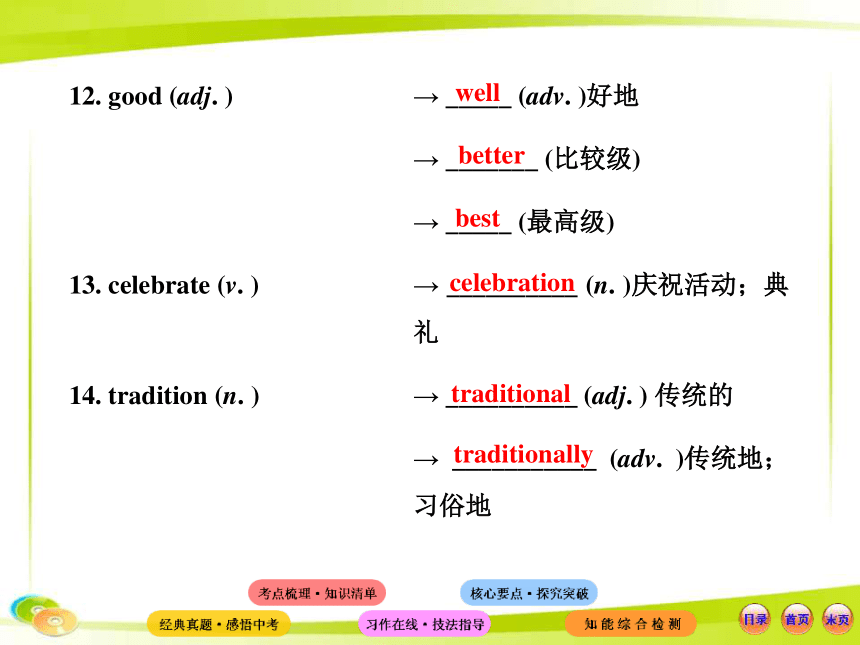
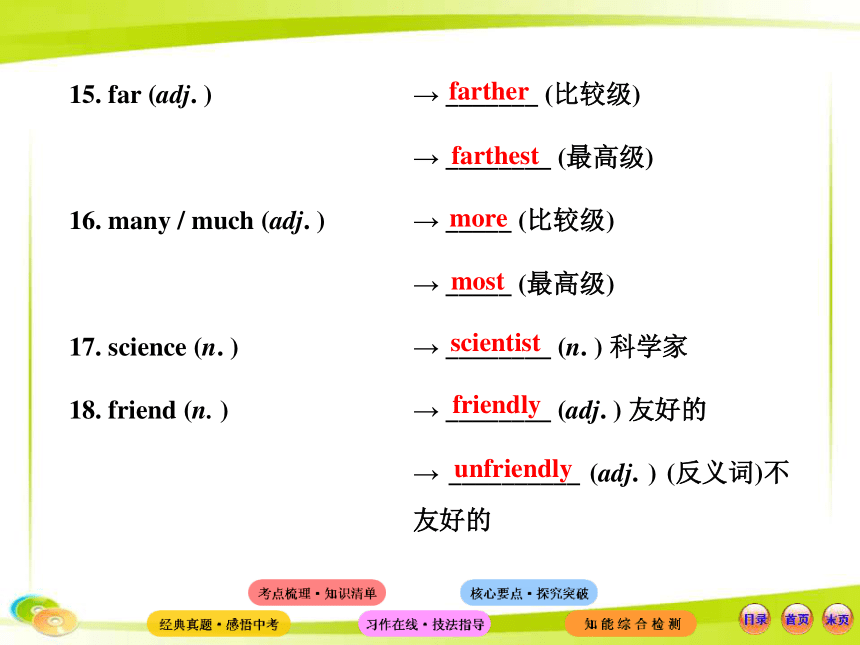
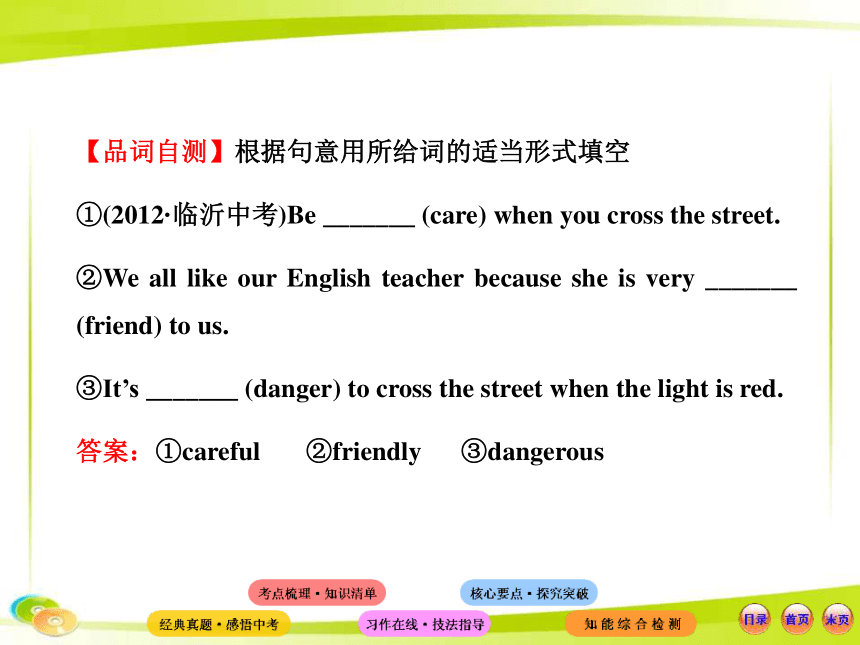
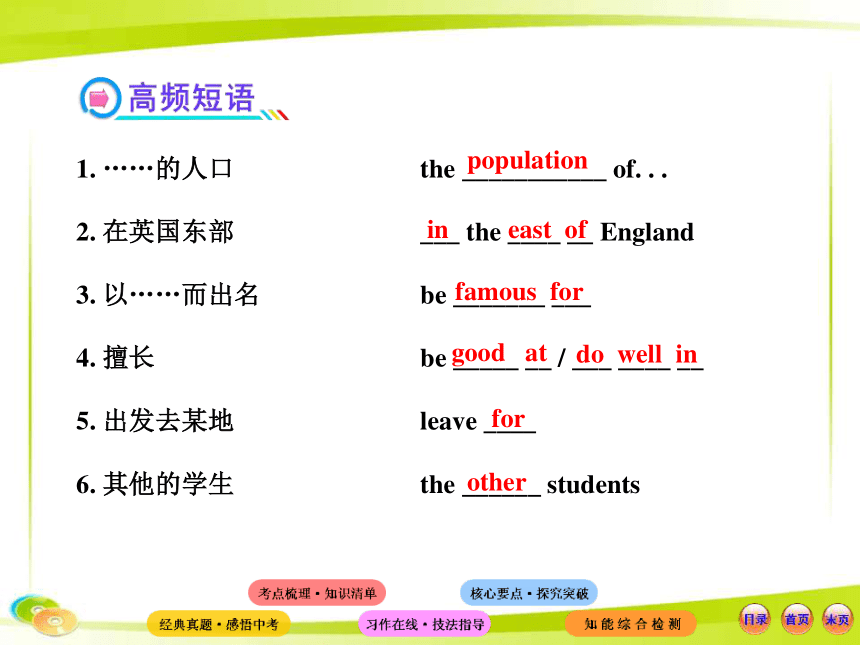
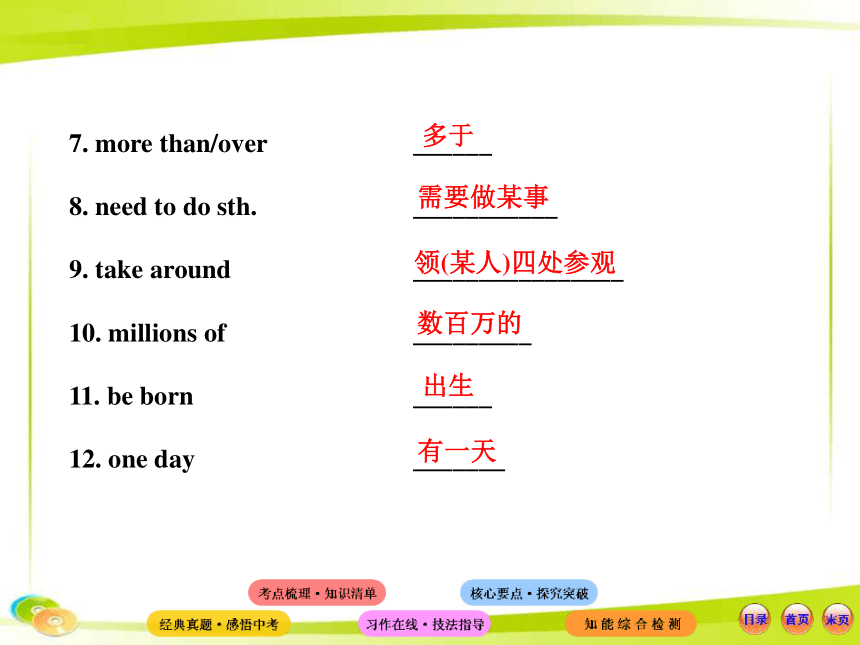
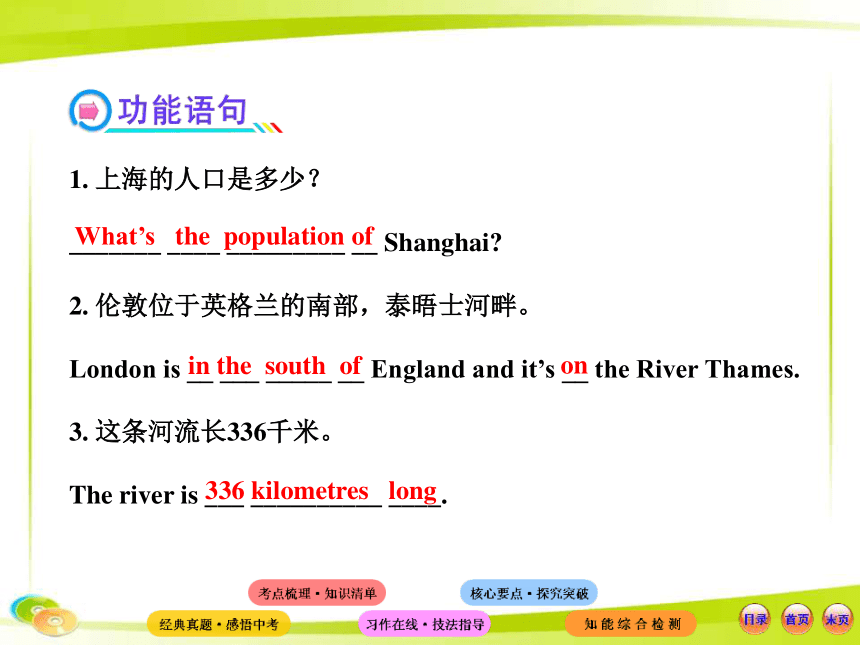
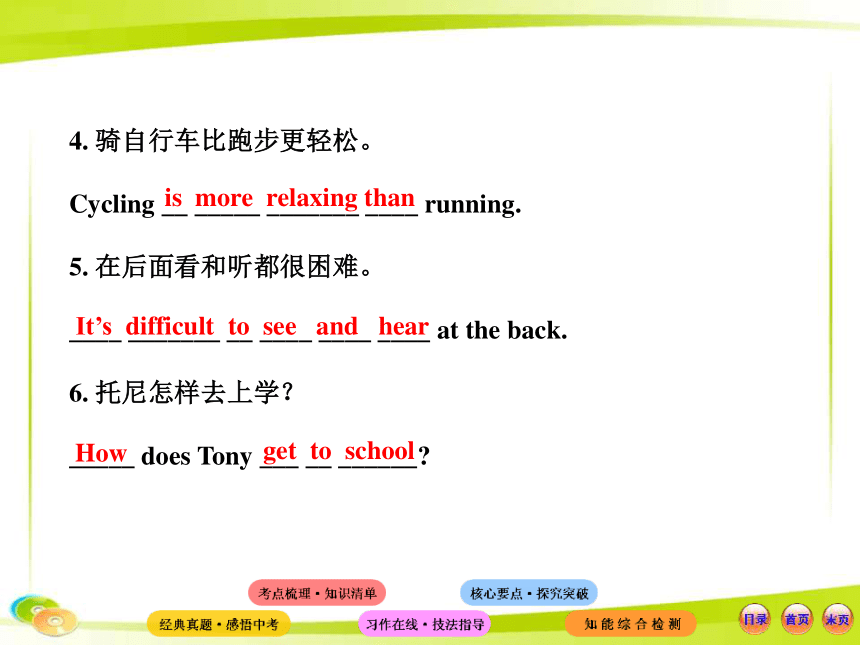
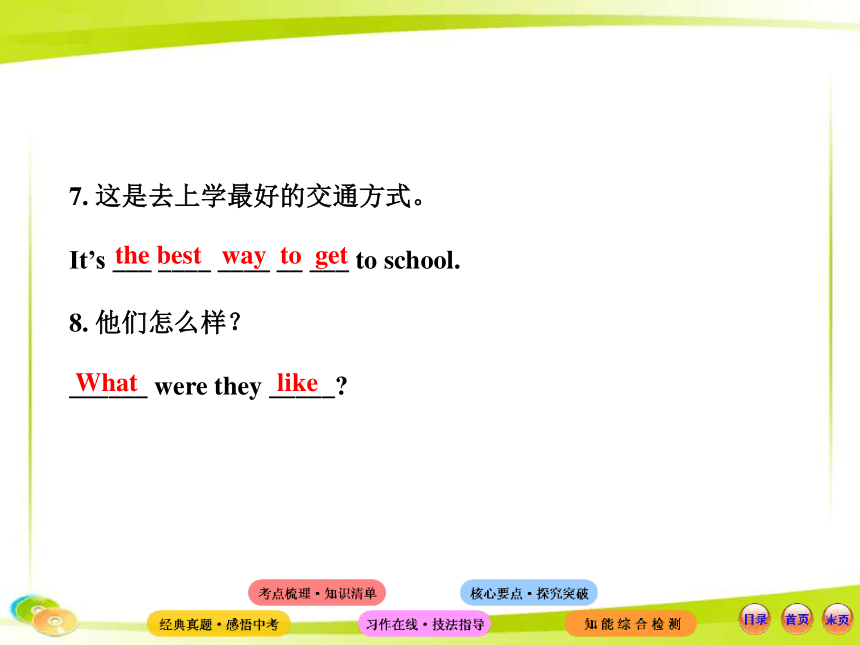
文档简介
(共62张PPT)
七年级下册 Modules 5~8
1. high (adj. ) → _______ (n. )高度
→ _______ (adv. ) 高度地
2. wide (adj. ) → _______ (adv. ) 广泛地
3. danger (n. ) → __________ (adj. )危险的
→ _____ (adj. )(反义词)安全的
→_______ (n. ) 安全
height
highly
widely
dangerous
safe
safety
4. excite (v. ) → ________ (adj. ) 激动人心的
→ _______ (adj. ) 感到兴奋的
5. tire (v. ) → ______ (adj. ) 累人的
→ _____ (adj. )疲劳的
6. popular (adj. ) → __________ (adj. ) (反义词)不受欢迎的
7. bore (v. ) → ______ (adj. ) 令人厌烦的
→ ______ (adj. ) 感到厌烦的
exciting
excited
tiring
tired
unpopular
boring
bored
8. relax (v. ) → ________ (adj. ) 放松的
→ _______ (adj. ) 感到放松的
9. visit (v. ) → ______ (n. ) 游客;观光者
10. bad (adj. ) → ______ (adv. )坏地;糟糕地
→ ______ (比较级)
→ ______ (最高级)
11. care (v. & n. ) → ________ (adj. ) 细心的
→ _________ (adv. )细心地;仔细地
relaxing
relaxed
visitor
badly
worse
worst
careful
carefully
12. good (adj. ) → _____ (adv. )好地
→ _______ (比较级)
→ _____ (最高级)
13. celebrate (v. ) → __________ (n. )庆祝活动;典 礼
14. tradition (n. ) → __________ (adj. ) 传统的
→ ___________ (adv. )传统地; 习俗地
well
better
best
celebration
traditional
traditionally
15. far (adj. ) → _______ (比较级)
→ ________ (最高级)
16. many / much (adj. ) → _____ (比较级)
→ _____ (最高级)
17. science (n. ) → ________ (n. ) 科学家
18. friend (n. ) → ________ (adj. ) 友好的
→ __________ (adj. ) (反义词)不 友好的
farther
farthest
more
most
scientist
friendly
unfriendly
【品词自测】根据句意用所给词的适当形式填空
①(2012·临沂中考)Be _______ (care) when you cross the street.
②We all like our English teacher because she is very _______ (friend) to us.
③It’s _______ (danger) to cross the street when the light is red.
答案:①careful ②friendly ③dangerous
1. ……的人口 the ___________ of. . .
2. 在英国东部 ___ the ____ __ England
3. 以……而出名 be _______ ___
4. 擅长 be _____ __ / ___ ____ __
5. 出发去某地 leave ____
6. 其他的学生 the ______ students
population
in
east of
famous for
good at
do well in
for
other
7. more than/over ______
8. need to do sth. ___________
9. take around ________________
10. millions of _________
11. be born ______
12. one day _______
多于
需要做某事
领(某人)四处参观
数百万的
出生
有一天
1. 上海的人口是多少?
_______ ____ _________ __ Shanghai
2. 伦敦位于英格兰的南部,泰晤士河畔。
London is __ ___ _____ __ England and it’s __ the River Thames.
3. 这条河流长336千米。
The river is ___ __________ ____.
What’s the population of
in the south of
on
336 kilometres long
4. 骑自行车比跑步更轻松。
Cycling __ _____ _______ ____ running.
5. 在后面看和听都很困难。
____ _______ __ ____ ____ ____ at the back.
6. 托尼怎样去上学?
_____ does Tony ___ __ ______
is more relaxing than
It’s difficult to see and hear
How
get to school
7. 这是去上学最好的交通方式。
It’s ___ ____ ____ __ ___ to school.
8. 他们怎么样?
______ were they _____
the best way to get
What
like
形容词的比较级和最高级 【见P145】
1. need v. & modal v. 需要
◆Lots of visitors to the Olympic Games will speak English, so the people from Dongsi need to learn English quickly.
许多来观看奥运赛事的游客都讲英语,所以东四的居民们需要尽快学会英语。
①(2012·滨州中考)—Must I wait for you here
—No, you _______.
A. don’t B. can’t C. mustn’t D. needn’t
②The classroom needs _______ (clean). It’s too dirty.
③As a middle school student in the 21st century, I need _______ (learn) English well.
实义动词 ①need+ n. /pron. 需要……
②need+ ______ (do/to do)sth. 需要做某事
③sb. /sth. need+ ______(doing/to do)
=sb. /sth. need to be done某人/某事需要被……
情态动词 ①可用于否定句或用于引导一般疑问句
②后跟动词原形, 无人称、数和时态的变化
③在对must引导的一般疑问句进行否定回答时要用_______ (mustn’t/needn’t)
名词 作不可数名词,常用于短语in need of“需要”
【自主归纳】 need的用法总结
答案:①D ②cleaning ③to learn
to do
doing
needn’t
2. until prep. 直到……时;到……为止
◆These popular lessons will continue until 2008.
这些受欢迎的课将持续到2008年。
①(2012·铜仁中考)The bus driver always says to us, “Don’t get off _______ the bus stops. ”
A. when B. while C. until D. if
② I _______ (stay) here until your mother comes back.
【自主归纳】until的用法
(1)until可用作介词,后接表示时间的名词。
(2)until也可用作连词,后接时间状语从句。
①用于肯定句时,主句中的谓语动词通常是延续性动词,表示该动作一直延续到从句的谓语所表示的动作结束为止;
②用于否定句时,构成____. . . until. . . 句式,意为“直到……才……”,主句中的谓语动词通常是非延续性动词,表示该动作一直到从句的谓语所表示的动作结束时才开始;
③主句为一般将来时,从句用 ____________ (一般现在时/一般将来时)表将来。
答案:①C ②will stay
not
一般现在时
3. take v. 花费(时间)
◆The journey takes about ten minutes.
这次旅程要花费大约10分钟。
①(2012·广东中考)It took me two weeks _______ reading the novels written by Guo Jingming.
A. finish B. to finish
C. finishes D. finishing
②I spent two hours _______ this maths problem.
A. in B. on
C. with D. of
③They spent three hours _______ the difficult work.
A. finish B. finishing
C. to finish D. finished
动词(过去式,过去分词) 主语 常用结构
pay ( _____
____ )
答案:①B ②B ③B
take ( _____
_____ )
spend( _____
_____ )
cost (____ ____)
sb.
It
sb.
sth.
+pay+ +for sth.
It takes + +to do sth.
+spend+ / +on sth. /(in)doing sth.
sth. +cost+ +
paid,
paid
took,
taken
spent,
spent
cost, cost
【自主归纳】
4. however adv. 可是;然而
◆It’s difficult to see and hear at the back. However, the teacher speaks slowly and loudly to the older students so I can always hear clearly.
在教室后面很难看到和听到。然而, 老师对年龄较大的学生说得慢声音又洪亮, 所以我总是能听清楚。
①(2011·广安中考)—How about having a picnic with me
—I’d love to, _______ I’m afraid I have no time.
A. so B. and C. but
②It was raining heavily. _______, we went out to look for the lost boy.
A. But B. However C. And D. Or
【自主归纳】but与however的用法辨析
(1)but是并列连词,意义上表转折,意为“但是”。常置于句首或句中,置于句中时,其后不用逗号隔开。
(2)however用作连词时较but正式,但词义弱一些,并不直接引出相反的意见,常用作插入语,在句中的位置比较灵活,可置于句首、句中或句尾,常用逗号与其他成分隔开。
答案:①C ②B
5. in the south/north/east/west of. . .
在……的南部/北部/东部/西部
◆London is in the south of England and it’s on the River Thames. 伦敦位于英格兰的南部, 泰晤士河畔。
① Everybody knows that Taiwan is _______ the southeast of China.
A. in B. on C. of D. to
②Japan lies _______ the east of China.
A. in B. at C. on D. to
【自主归纳】表示位置的in/on/to
(1)be可替换为 lie,表示“位于”。
(2)表示“在某地的……(方位)”
in east
be on the west of(+地点)
to south
north
(in 境内;___ 接壤;___不接壤)
说明:B is in the east of A.
C is on the east of A.
D is to the east of A.
(简记:包含用in,相切用on,相离用to。)
答案:①A ②D
on
to
6. be good at 擅长
◆Chinese people are very good at gymnastics.
中国人很擅长体操。
①Being good _______ getting on well with the kids is fine.
A. for B. to C. at D. of
②Doing eye exercises is ______ ______ (对……有利)our eyes.
③Lang Lang is good at playing the piano. (改为同义句)
Lang Lang ______ ______ ______ playing the piano.
【自主归纳】be good at/for/to/with的用法
(1)be good ___ 意为“擅长……”,后接名词、代词或v. -ing。
(2)be good ____ 意为 “对……有好处”。
(3)be good ___ 意为“对……友好”。
(4)be good with意为“擅长;与……相处得好”。
答案:①C ②good for ③does well in
at
for
to
7. What’s the population of Shanghai
上海有多少人口?
①(2012·随州中考)The world’s population is growing _______, and there is _______ land and water for growing rice.
A. larger; less B. larger; fewer
C. more; less D. more; fewer
②About seventy percent of the population in China _______ farmers.
A. is B. are C. be D. has
③How many people are there in your city (改为同义句)
______ ______ ______ ______ your city
【自主归纳】population的用法
(1)population常与定冠词the连用, 作主语时, 谓语动词常用 _____ (单数/复数)形式。
(2)当主语是表示“人口的百分之几、几分之几”时, 谓语动词用 _____ (单数/复数)形式。
单数
复数
(3)有时population可用作可数名词, 其前可用不定冠词,构成a population of. . . 。
(4)表示人口的“多”或“少”,不用much或little,而要用________ 或_____。
(5)询问某国、某地有多少人口时,用how many people are there in. . . /How large is the population of. . . / _______ the population of. . .
答案:①A ②B ③What’s the population of
large/big
small
What’s
【判断抢答】判断下面句子翻译正误
你们家乡的人口有多少?
①How much is the population of your hometown (?)
②What is the population of your hometown ( )
×
√
Ⅰ. 根据句意及首字母或汉语提示完成单词
1. (2011·广州中考)Listen carefully and a _______ my question.
2. (2011·桂林中考)She was b _______ in a beautiful village near the Lijiang River in 1995.
3. (2011·铜仁中考)It is the harvest time. The farmers are b _______ getting in the crops.
答案:1. answer 2. born 3. busy
4. (2011·济宁中考)The Smiths go to _______ (教堂) every Sunday morning.
5. (2012·恩施中考)The children didn’t go to bed u _______ their mother came back.
6. (2012· 湖州中考)The subways in Shanghai are often very c_______ on weekends. Sometimes you can hardly move yourselves.
7. (2011·湖州中考)Lang Lang is a very _______ (著名的) pianist.
答案: 4. church 5. until 6. crowded 7. famous
8. (2011· 乌鲁木齐中考)There is too much noise in the classroom. Please speak more _______ (大声地).
9. (2012·枣庄中考)You can be in our school _______ (音乐)festival.
10. (2011·杭州中考)Susan was born in a v _______ but she works in the city now.
答案: 8. loudly 9. music 10. village
11. (2011·日照中考)Thousands of v _______ come to our city for sightseeing every year.
12. (2012·恩施中考)Now parents are _______ (花费) more and more money on their children’s education.
答案: 11. visitors 12. spending
Ⅱ. 用所给词的适当形式填空
1. (2011·遵义中考)Windy does _______ (badly) in P. E. than me.
2. (2011·宿迁中考)Beijing is one of _______ (beautiful) places in China, and I have been there twice.
3. (2011·无锡中考)The Women’s World Cup _______ (not begin) until 1991 when China hosted it in Guangzhou.
答案:1. worse 2. the most beautiful 3. didn’t begin
4. (2012·滨州中考)Mr Zhang _______ (teach)us English three years ago.
5. (2011·黔南中考)I think it is _______ (danger) for children to be close to wild animals.
6. (2012·恩施中考)The lecture was so _______ (bore) that some people fell asleep while listening.
7. (2011·攀枝花中考)He is one of the great _______ (science) in the world.
答案:4. taught 5. dangerous 6. boring 7. scientists
8. (2012·贵阳中考)“When is Mother’s Day ”“It’s on the _______ (two) Sunday in May every year. ”
9. (2011·临沂中考)As we know, Zhang Jiajie is famous for the different _______ (shape) of mountains.
10. (2011·钦州中考)It was raining hard, so it _______ (take) them three hours to get to the place.
11. (2011·临沂中考)My neighbor Helen never talks to me. She is so _______ (friendly).
答案:8. second 9. shapes 10. took 11. unfriendly
Ⅲ. 单项选择
1. (2012·铜仁中考)The weather in Guiyang in summer is _______ than that in Tongren. They’re different.
A. cool B. much cooler C. hot D. much hotter
【解析】选B。根据than选用比较级可排除A和C项,根据常识可知“贵阳的天气比铜仁的要凉快”。
2. (2012·临沂中考)English is my favorite subject, and I am good _______ it.
A. for B. to C. at D. of
【解析】选C。考查固定短语。句意:英语是我最喜爱的学科,并且我很擅长它。be good at. . . 擅长……。
3. (2012·江西中考)My dog is very _______. It is safe to touch him if you want to.
A. smart B. brave
C. happy D. friendly
【解析】选D。考查形容词辨析。smart“聪明的”;brave“勇敢的”;happy“高兴的”;friendly“友好的”。根据后半句句意“如果你想要摸它是安全的”可知我的狗非常友好。故选D。
4. (2012·永州中考)My father _______ one hundred thousand yuan on his new car.
A. spent B. cost C. paid
【解析】选A。考查词义辨析。句意:我爸爸花了10万元买了辆新车。spent. . . on sth. 在某物上花费……;cost应该用物作主语;pay. . . for. . . 买……花了……。由句意可知,应选A。
5. (2011·安顺中考)—Today is the _______ day in my life, because I won the first prize in the competition.
—Congratulations!
A. happy B. happiest
C. happier D. much happier
【解析】选B。考查形容词最高级。the的后面接形容词的最高级。
6. (2011·柳州中考)Mr. Wang will arrive in England in two days.
A. put on B. turn off C. get to
【解析】选C。画线部分是“到达”的意思。
7. (2011·沈阳中考)It is very important _______ people to have food and water every day.
A. for B. of C. with D. about
【解析】选A。考查介词的用法。It’s + adj. + for sb. +to do sth. 做某事对某人来讲是……。
8. (2011·广州中考)How dangerous! She was driving the car with one hand and holding an ice cream with _______.
A. the other B. another
C. others D. other
【解析】选 A。考查不定代词。the other 指两者之中另外一个;another泛指,另外一个;others 泛指,其他的人或事物;other泛指,其他的,后跟名词。根据句意“多危险啊!她一手开车一手拿着冰激凌。”可知选A。
9. (2011·内江中考)Last night Dad and Mum didn’t come back home _______ I finished my homework.
A. while B. if C. until
【解析】选C。考查短语not. . . until 直到……才。由句意“昨天晚上我爸爸妈妈直到我写完作业才回家。”可知应选C。
介绍家乡是历年许多地市中考考查频率最高的话题之一,其中以学生们为背景设题最为常见。在写作此类话题作文过程中要特别注意几点:1. 抓住家乡的特点;2. 结构要合理。
【典题示例】
(2011· 恩施中考)
“两路”的开通,为恩施旅游业带来了新的发展机遇。许多外国人也来到恩施参观旅游。假如你是一位导游,请根据写作要点,向外国客人介绍一下恩施的情况。
写作要点:1. 位于湖北省西南部,人口约385万,恩施人质朴善良。
2. 气候宜人,空气新鲜,是最适合人类居住的地方。
3. “两路”建成,交通更便利,山水洞齐美,名胜很多。
参考词汇:恩施大峡谷Enshi Grand Canyon;腾龙洞Tenglong Cave; 两路the Hurongxi Expressway and Yiwan Railway; 方便的 convenient;适宜的 suitable
温馨提示: 1. 短文内容应包含所提示的要点,语言流畅,不要逐字翻译,可适当发挥;
2. 短文词数不少于80, 短文开头和结尾已替你写好,不计入总词数;
3. 文中不得出现与考生本人相关的真实的人名、校名和地名。
Hello, everyone! Welcome to Enshi. I’m your tour guide. Now let me introduce my hometown—Enshi to you.
________________________________________________________________________________________________________________________________________________________________________________________________________________________
I hope you’ll have a good time.
【审题谋篇】
1. 本篇文章应为说明文。主要考查学生如何根据所学的内容来介绍自己的家乡的能力。
2. 人称:第一人称
3. 主要时态:一般现在时
4. 高分模板:
【佳作诵读】
Hello, everyone! Welcome to Enshi. I’m your tour guide. Now let me introduce my hometown—Enshi to you.
It is a mountain city which lies in the southwest of Hubei Province. It has a population of 3, 850, 000 and people here are very kind. The air is fresh and the climate is neither too hot nor too cold. It’s the most suitable place for people to live in.
In recent years, many great changes have taken place here. The Hurongxi Expressway and Yiwan Railway have been built, which make the traffic much more convenient.
There are a lot of beautiful mountains, rivers and caves. You can enjoy many places of interest, such as Enshi Grand Canyon, Tenglong Cave and so on.
I hope you’ll have a good time.
【名师点睛】
(1)文章以导游的身份,用解说词的形式开头,亲切、自然。
(2)文章成功运用了in the southwest of, a population of, It’s +adj. +n. + for sb. to do sth. 及形容词的比较级和最高级等,是一篇很好的英语作文。
七年级下册 Modules 5~8
1. high (adj. ) → _______ (n. )高度
→ _______ (adv. ) 高度地
2. wide (adj. ) → _______ (adv. ) 广泛地
3. danger (n. ) → __________ (adj. )危险的
→ _____ (adj. )(反义词)安全的
→_______ (n. ) 安全
height
highly
widely
dangerous
safe
safety
4. excite (v. ) → ________ (adj. ) 激动人心的
→ _______ (adj. ) 感到兴奋的
5. tire (v. ) → ______ (adj. ) 累人的
→ _____ (adj. )疲劳的
6. popular (adj. ) → __________ (adj. ) (反义词)不受欢迎的
7. bore (v. ) → ______ (adj. ) 令人厌烦的
→ ______ (adj. ) 感到厌烦的
exciting
excited
tiring
tired
unpopular
boring
bored
8. relax (v. ) → ________ (adj. ) 放松的
→ _______ (adj. ) 感到放松的
9. visit (v. ) → ______ (n. ) 游客;观光者
10. bad (adj. ) → ______ (adv. )坏地;糟糕地
→ ______ (比较级)
→ ______ (最高级)
11. care (v. & n. ) → ________ (adj. ) 细心的
→ _________ (adv. )细心地;仔细地
relaxing
relaxed
visitor
badly
worse
worst
careful
carefully
12. good (adj. ) → _____ (adv. )好地
→ _______ (比较级)
→ _____ (最高级)
13. celebrate (v. ) → __________ (n. )庆祝活动;典 礼
14. tradition (n. ) → __________ (adj. ) 传统的
→ ___________ (adv. )传统地; 习俗地
well
better
best
celebration
traditional
traditionally
15. far (adj. ) → _______ (比较级)
→ ________ (最高级)
16. many / much (adj. ) → _____ (比较级)
→ _____ (最高级)
17. science (n. ) → ________ (n. ) 科学家
18. friend (n. ) → ________ (adj. ) 友好的
→ __________ (adj. ) (反义词)不 友好的
farther
farthest
more
most
scientist
friendly
unfriendly
【品词自测】根据句意用所给词的适当形式填空
①(2012·临沂中考)Be _______ (care) when you cross the street.
②We all like our English teacher because she is very _______ (friend) to us.
③It’s _______ (danger) to cross the street when the light is red.
答案:①careful ②friendly ③dangerous
1. ……的人口 the ___________ of. . .
2. 在英国东部 ___ the ____ __ England
3. 以……而出名 be _______ ___
4. 擅长 be _____ __ / ___ ____ __
5. 出发去某地 leave ____
6. 其他的学生 the ______ students
population
in
east of
famous for
good at
do well in
for
other
7. more than/over ______
8. need to do sth. ___________
9. take around ________________
10. millions of _________
11. be born ______
12. one day _______
多于
需要做某事
领(某人)四处参观
数百万的
出生
有一天
1. 上海的人口是多少?
_______ ____ _________ __ Shanghai
2. 伦敦位于英格兰的南部,泰晤士河畔。
London is __ ___ _____ __ England and it’s __ the River Thames.
3. 这条河流长336千米。
The river is ___ __________ ____.
What’s the population of
in the south of
on
336 kilometres long
4. 骑自行车比跑步更轻松。
Cycling __ _____ _______ ____ running.
5. 在后面看和听都很困难。
____ _______ __ ____ ____ ____ at the back.
6. 托尼怎样去上学?
_____ does Tony ___ __ ______
is more relaxing than
It’s difficult to see and hear
How
get to school
7. 这是去上学最好的交通方式。
It’s ___ ____ ____ __ ___ to school.
8. 他们怎么样?
______ were they _____
the best way to get
What
like
形容词的比较级和最高级 【见P145】
1. need v. & modal v. 需要
◆Lots of visitors to the Olympic Games will speak English, so the people from Dongsi need to learn English quickly.
许多来观看奥运赛事的游客都讲英语,所以东四的居民们需要尽快学会英语。
①(2012·滨州中考)—Must I wait for you here
—No, you _______.
A. don’t B. can’t C. mustn’t D. needn’t
②The classroom needs _______ (clean). It’s too dirty.
③As a middle school student in the 21st century, I need _______ (learn) English well.
实义动词 ①need+ n. /pron. 需要……
②need+ ______ (do/to do)sth. 需要做某事
③sb. /sth. need+ ______(doing/to do)
=sb. /sth. need to be done某人/某事需要被……
情态动词 ①可用于否定句或用于引导一般疑问句
②后跟动词原形, 无人称、数和时态的变化
③在对must引导的一般疑问句进行否定回答时要用_______ (mustn’t/needn’t)
名词 作不可数名词,常用于短语in need of“需要”
【自主归纳】 need的用法总结
答案:①D ②cleaning ③to learn
to do
doing
needn’t
2. until prep. 直到……时;到……为止
◆These popular lessons will continue until 2008.
这些受欢迎的课将持续到2008年。
①(2012·铜仁中考)The bus driver always says to us, “Don’t get off _______ the bus stops. ”
A. when B. while C. until D. if
② I _______ (stay) here until your mother comes back.
【自主归纳】until的用法
(1)until可用作介词,后接表示时间的名词。
(2)until也可用作连词,后接时间状语从句。
①用于肯定句时,主句中的谓语动词通常是延续性动词,表示该动作一直延续到从句的谓语所表示的动作结束为止;
②用于否定句时,构成____. . . until. . . 句式,意为“直到……才……”,主句中的谓语动词通常是非延续性动词,表示该动作一直到从句的谓语所表示的动作结束时才开始;
③主句为一般将来时,从句用 ____________ (一般现在时/一般将来时)表将来。
答案:①C ②will stay
not
一般现在时
3. take v. 花费(时间)
◆The journey takes about ten minutes.
这次旅程要花费大约10分钟。
①(2012·广东中考)It took me two weeks _______ reading the novels written by Guo Jingming.
A. finish B. to finish
C. finishes D. finishing
②I spent two hours _______ this maths problem.
A. in B. on
C. with D. of
③They spent three hours _______ the difficult work.
A. finish B. finishing
C. to finish D. finished
动词(过去式,过去分词) 主语 常用结构
pay ( _____
____ )
答案:①B ②B ③B
take ( _____
_____ )
spend( _____
_____ )
cost (____ ____)
sb.
It
sb.
sth.
+pay+ +for sth.
It takes + +to do sth.
+spend+ / +on sth. /(in)doing sth.
sth. +cost+ +
paid,
paid
took,
taken
spent,
spent
cost, cost
【自主归纳】
4. however adv. 可是;然而
◆It’s difficult to see and hear at the back. However, the teacher speaks slowly and loudly to the older students so I can always hear clearly.
在教室后面很难看到和听到。然而, 老师对年龄较大的学生说得慢声音又洪亮, 所以我总是能听清楚。
①(2011·广安中考)—How about having a picnic with me
—I’d love to, _______ I’m afraid I have no time.
A. so B. and C. but
②It was raining heavily. _______, we went out to look for the lost boy.
A. But B. However C. And D. Or
【自主归纳】but与however的用法辨析
(1)but是并列连词,意义上表转折,意为“但是”。常置于句首或句中,置于句中时,其后不用逗号隔开。
(2)however用作连词时较but正式,但词义弱一些,并不直接引出相反的意见,常用作插入语,在句中的位置比较灵活,可置于句首、句中或句尾,常用逗号与其他成分隔开。
答案:①C ②B
5. in the south/north/east/west of. . .
在……的南部/北部/东部/西部
◆London is in the south of England and it’s on the River Thames. 伦敦位于英格兰的南部, 泰晤士河畔。
① Everybody knows that Taiwan is _______ the southeast of China.
A. in B. on C. of D. to
②Japan lies _______ the east of China.
A. in B. at C. on D. to
【自主归纳】表示位置的in/on/to
(1)be可替换为 lie,表示“位于”。
(2)表示“在某地的……(方位)”
in east
be on the west of(+地点)
to south
north
(in 境内;___ 接壤;___不接壤)
说明:B is in the east of A.
C is on the east of A.
D is to the east of A.
(简记:包含用in,相切用on,相离用to。)
答案:①A ②D
on
to
6. be good at 擅长
◆Chinese people are very good at gymnastics.
中国人很擅长体操。
①Being good _______ getting on well with the kids is fine.
A. for B. to C. at D. of
②Doing eye exercises is ______ ______ (对……有利)our eyes.
③Lang Lang is good at playing the piano. (改为同义句)
Lang Lang ______ ______ ______ playing the piano.
【自主归纳】be good at/for/to/with的用法
(1)be good ___ 意为“擅长……”,后接名词、代词或v. -ing。
(2)be good ____ 意为 “对……有好处”。
(3)be good ___ 意为“对……友好”。
(4)be good with意为“擅长;与……相处得好”。
答案:①C ②good for ③does well in
at
for
to
7. What’s the population of Shanghai
上海有多少人口?
①(2012·随州中考)The world’s population is growing _______, and there is _______ land and water for growing rice.
A. larger; less B. larger; fewer
C. more; less D. more; fewer
②About seventy percent of the population in China _______ farmers.
A. is B. are C. be D. has
③How many people are there in your city (改为同义句)
______ ______ ______ ______ your city
【自主归纳】population的用法
(1)population常与定冠词the连用, 作主语时, 谓语动词常用 _____ (单数/复数)形式。
(2)当主语是表示“人口的百分之几、几分之几”时, 谓语动词用 _____ (单数/复数)形式。
单数
复数
(3)有时population可用作可数名词, 其前可用不定冠词,构成a population of. . . 。
(4)表示人口的“多”或“少”,不用much或little,而要用________ 或_____。
(5)询问某国、某地有多少人口时,用how many people are there in. . . /How large is the population of. . . / _______ the population of. . .
答案:①A ②B ③What’s the population of
large/big
small
What’s
【判断抢答】判断下面句子翻译正误
你们家乡的人口有多少?
①How much is the population of your hometown (?)
②What is the population of your hometown ( )
×
√
Ⅰ. 根据句意及首字母或汉语提示完成单词
1. (2011·广州中考)Listen carefully and a _______ my question.
2. (2011·桂林中考)She was b _______ in a beautiful village near the Lijiang River in 1995.
3. (2011·铜仁中考)It is the harvest time. The farmers are b _______ getting in the crops.
答案:1. answer 2. born 3. busy
4. (2011·济宁中考)The Smiths go to _______ (教堂) every Sunday morning.
5. (2012·恩施中考)The children didn’t go to bed u _______ their mother came back.
6. (2012· 湖州中考)The subways in Shanghai are often very c_______ on weekends. Sometimes you can hardly move yourselves.
7. (2011·湖州中考)Lang Lang is a very _______ (著名的) pianist.
答案: 4. church 5. until 6. crowded 7. famous
8. (2011· 乌鲁木齐中考)There is too much noise in the classroom. Please speak more _______ (大声地).
9. (2012·枣庄中考)You can be in our school _______ (音乐)festival.
10. (2011·杭州中考)Susan was born in a v _______ but she works in the city now.
答案: 8. loudly 9. music 10. village
11. (2011·日照中考)Thousands of v _______ come to our city for sightseeing every year.
12. (2012·恩施中考)Now parents are _______ (花费) more and more money on their children’s education.
答案: 11. visitors 12. spending
Ⅱ. 用所给词的适当形式填空
1. (2011·遵义中考)Windy does _______ (badly) in P. E. than me.
2. (2011·宿迁中考)Beijing is one of _______ (beautiful) places in China, and I have been there twice.
3. (2011·无锡中考)The Women’s World Cup _______ (not begin) until 1991 when China hosted it in Guangzhou.
答案:1. worse 2. the most beautiful 3. didn’t begin
4. (2012·滨州中考)Mr Zhang _______ (teach)us English three years ago.
5. (2011·黔南中考)I think it is _______ (danger) for children to be close to wild animals.
6. (2012·恩施中考)The lecture was so _______ (bore) that some people fell asleep while listening.
7. (2011·攀枝花中考)He is one of the great _______ (science) in the world.
答案:4. taught 5. dangerous 6. boring 7. scientists
8. (2012·贵阳中考)“When is Mother’s Day ”“It’s on the _______ (two) Sunday in May every year. ”
9. (2011·临沂中考)As we know, Zhang Jiajie is famous for the different _______ (shape) of mountains.
10. (2011·钦州中考)It was raining hard, so it _______ (take) them three hours to get to the place.
11. (2011·临沂中考)My neighbor Helen never talks to me. She is so _______ (friendly).
答案:8. second 9. shapes 10. took 11. unfriendly
Ⅲ. 单项选择
1. (2012·铜仁中考)The weather in Guiyang in summer is _______ than that in Tongren. They’re different.
A. cool B. much cooler C. hot D. much hotter
【解析】选B。根据than选用比较级可排除A和C项,根据常识可知“贵阳的天气比铜仁的要凉快”。
2. (2012·临沂中考)English is my favorite subject, and I am good _______ it.
A. for B. to C. at D. of
【解析】选C。考查固定短语。句意:英语是我最喜爱的学科,并且我很擅长它。be good at. . . 擅长……。
3. (2012·江西中考)My dog is very _______. It is safe to touch him if you want to.
A. smart B. brave
C. happy D. friendly
【解析】选D。考查形容词辨析。smart“聪明的”;brave“勇敢的”;happy“高兴的”;friendly“友好的”。根据后半句句意“如果你想要摸它是安全的”可知我的狗非常友好。故选D。
4. (2012·永州中考)My father _______ one hundred thousand yuan on his new car.
A. spent B. cost C. paid
【解析】选A。考查词义辨析。句意:我爸爸花了10万元买了辆新车。spent. . . on sth. 在某物上花费……;cost应该用物作主语;pay. . . for. . . 买……花了……。由句意可知,应选A。
5. (2011·安顺中考)—Today is the _______ day in my life, because I won the first prize in the competition.
—Congratulations!
A. happy B. happiest
C. happier D. much happier
【解析】选B。考查形容词最高级。the的后面接形容词的最高级。
6. (2011·柳州中考)Mr. Wang will arrive in England in two days.
A. put on B. turn off C. get to
【解析】选C。画线部分是“到达”的意思。
7. (2011·沈阳中考)It is very important _______ people to have food and water every day.
A. for B. of C. with D. about
【解析】选A。考查介词的用法。It’s + adj. + for sb. +to do sth. 做某事对某人来讲是……。
8. (2011·广州中考)How dangerous! She was driving the car with one hand and holding an ice cream with _______.
A. the other B. another
C. others D. other
【解析】选 A。考查不定代词。the other 指两者之中另外一个;another泛指,另外一个;others 泛指,其他的人或事物;other泛指,其他的,后跟名词。根据句意“多危险啊!她一手开车一手拿着冰激凌。”可知选A。
9. (2011·内江中考)Last night Dad and Mum didn’t come back home _______ I finished my homework.
A. while B. if C. until
【解析】选C。考查短语not. . . until 直到……才。由句意“昨天晚上我爸爸妈妈直到我写完作业才回家。”可知应选C。
介绍家乡是历年许多地市中考考查频率最高的话题之一,其中以学生们为背景设题最为常见。在写作此类话题作文过程中要特别注意几点:1. 抓住家乡的特点;2. 结构要合理。
【典题示例】
(2011· 恩施中考)
“两路”的开通,为恩施旅游业带来了新的发展机遇。许多外国人也来到恩施参观旅游。假如你是一位导游,请根据写作要点,向外国客人介绍一下恩施的情况。
写作要点:1. 位于湖北省西南部,人口约385万,恩施人质朴善良。
2. 气候宜人,空气新鲜,是最适合人类居住的地方。
3. “两路”建成,交通更便利,山水洞齐美,名胜很多。
参考词汇:恩施大峡谷Enshi Grand Canyon;腾龙洞Tenglong Cave; 两路the Hurongxi Expressway and Yiwan Railway; 方便的 convenient;适宜的 suitable
温馨提示: 1. 短文内容应包含所提示的要点,语言流畅,不要逐字翻译,可适当发挥;
2. 短文词数不少于80, 短文开头和结尾已替你写好,不计入总词数;
3. 文中不得出现与考生本人相关的真实的人名、校名和地名。
Hello, everyone! Welcome to Enshi. I’m your tour guide. Now let me introduce my hometown—Enshi to you.
________________________________________________________________________________________________________________________________________________________________________________________________________________________
I hope you’ll have a good time.
【审题谋篇】
1. 本篇文章应为说明文。主要考查学生如何根据所学的内容来介绍自己的家乡的能力。
2. 人称:第一人称
3. 主要时态:一般现在时
4. 高分模板:
【佳作诵读】
Hello, everyone! Welcome to Enshi. I’m your tour guide. Now let me introduce my hometown—Enshi to you.
It is a mountain city which lies in the southwest of Hubei Province. It has a population of 3, 850, 000 and people here are very kind. The air is fresh and the climate is neither too hot nor too cold. It’s the most suitable place for people to live in.
In recent years, many great changes have taken place here. The Hurongxi Expressway and Yiwan Railway have been built, which make the traffic much more convenient.
There are a lot of beautiful mountains, rivers and caves. You can enjoy many places of interest, such as Enshi Grand Canyon, Tenglong Cave and so on.
I hope you’ll have a good time.
【名师点睛】
(1)文章以导游的身份,用解说词的形式开头,亲切、自然。
(2)文章成功运用了in the southwest of, a population of, It’s +adj. +n. + for sb. to do sth. 及形容词的比较级和最高级等,是一篇很好的英语作文。
